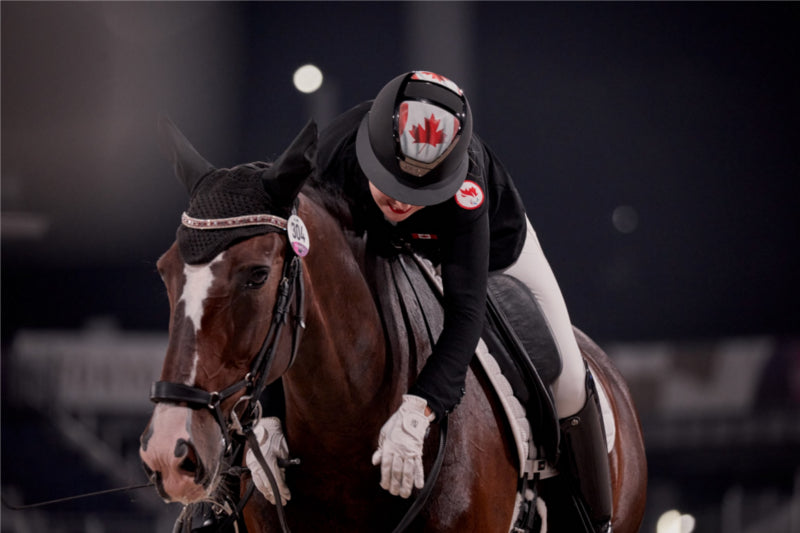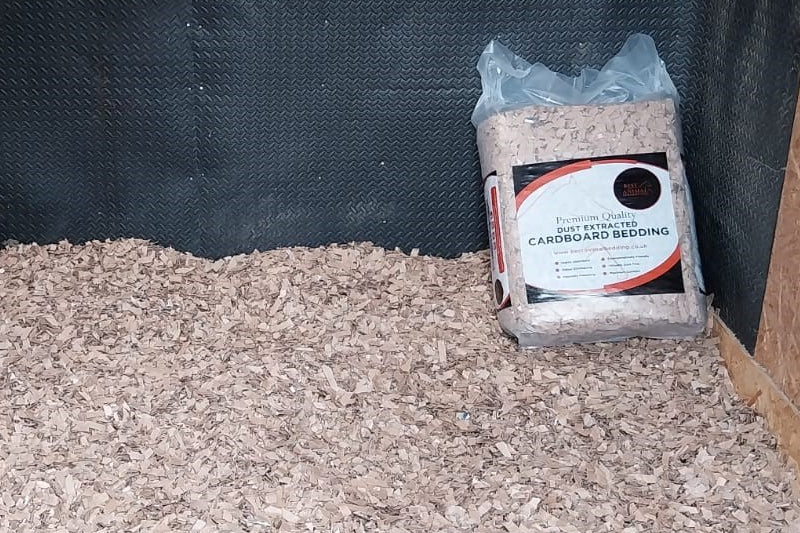The following blog post was written by one of our fantastic brand ambassadors Roberta Sheffield, Canadian Para-Equestrian Paralympic Team member and dressage rider.
Most horse owners dread their veterinarian telling them that their beloved horse needs a period of bed rest, the horse equivalent of medical bed rest. It strikes fear and trepidation into everyone of us that’s been through the process before.
It would be easy to write a book on my experiences of box resting horses from my time as a groom in international competition barns and from those times when my own horses have needed this situation but I will try to keep this blog to one cup of coffee length!
The most important thing you can do is talk to your veterinarian. Make sure you know the purpose of the box rest; is it to keep a wound clean, keep a bone or soft tissue injury still or after colic surgery? You need to know EXACTLY what your horse is allowed to do. Sometimes, they allow hand grazing, or turnout in a stable sized area of field which would make the process a lot less difficult, especially if your horse plays ball and stays calm about things.
You may need additional support from your vet as in check ups, medications and dressing changes. If your horse isn’t settled on box rest then you may need their help to sedate your horse for everyone’s safety. There are options to just take the edge off things if necessary. They are your ally, check in with them, ask advice and if you are struggling reach out to them because they may be able to modify the plan to keep you all safe.
But first of all, you want to create the most comfortable, relaxing restful healing environment for the horse. There will be challenges as horses are physiologically and mentally designed to move, a lot, and you job is to prevent them from moving to allow them to heal. Discuss with your vet whether they are allowed a big stable or have to have a small stable. In some rare cases the horse has to be cross-tied to prevent any movement or lying down.
If your horse is trustworthy with a stall guard or chain these can better to increase the airflow and make him feel less claustrophobic with the door is open as much as possible. But he must not escape and end up running around the barn like a headless chicken. Not escaping is an absolute priority! One moment of charging about can undo weeks of hard work.
In the stable, you’ll need a great bedding. Your bedding will take on an importance you never knew it had! You want to choose something that’s virtually dust free to protect the horse’s lungs as he will have no respite from the dust and no opportunity to clear his airways. It wants to be non-palatable material to avoid your horse boredom-munching his way through it and giving himself colic.
A bedding that’s easy to muck out will make your life easier as it maybe that the horse isn’t even allowed to be moved to another stable while you muck out to begin with. You’re probably going to want to give a generous bed to encourage comfortable lying down as much as possible. I like to put a good layer of bed on top of rubber matting for extra softness. Try to have the bedding organised in such a way that the horse doesn’t end up standing for long periods of time with his back feet higher than his front feet. This often happens when the horse is looking out of the door. It can cause back pain and strain on the front legs.
Hypoallergenic beddings help prevent sore skin or itchy patches. The needles in barley straw or splinters in chopped wood beddings can get into bandages, rugs and dressings causing irritation. Cardboard bedding like Best Animal Bedding, is a game-changer for sensitive skins and airways.
How you feed your hay or forage matters as you want to discourage addition walking about, so it makes sense to put it by the door. If the vet agrees, feeding from the floor can be better for their airways and topline muscles. Feeding ab lib soaked forage may be necessary to help with boredom without piling on the pounds and it also helps prevent impaction colic.
I would avoid the treat balls that roll around on the floor. They encourage the horse to get excited and frustrated, and most importantly move around the stable contorting their bodies as they bang the ball. We want a calm, non- excited horse as much as possible. Hanging treats, as long as they aren’t full of sugar, are a better option or mix some different forages and a few pieces of carrot together in a heap on the floor for the horse to pick through. You can pick safe herbs, weeds and long grasses from the field and hedgerow as a tasty treat.
You will most probably need to change your horse’s bucket feed, your veterinarian or one of the feed company helplines should be able to advise you. Generally, you want to cut the calories right down, especially those from cereals and high sugar/starch sources but you still need to give the horse the protein and vitamins and minerals he needs to heal. A calming supplement can be helpful too.
Colic is your enemy so watch the horse’s water intake. The lack of movement can slow the gut down, allowing it to dry out and get stuck. Watch for droppings looking smaller, drier or less frequent. Change the water twice a day. Sometimes its useful to flavour the water with something. Mine like the TopSpec Electrolyte powder. If it is summer then this is even more important, wooden stables often get very hot so your horse may be sweating just standing still. Soaked hay or haylage is a way of helping hydration.
Lastly, it’s super important to make time for your horse even though you aren’t riding him. They are social creatures by nature so box rest and box rest can be very isolating. Finding a way to take your laptop to the stable so you can work while sat with your horse or just have a regular coffee date with your horse. Don’t skip grooming them each day, make them feel loved and special, they don’t know why they are having to go through this difficult period. You could even park their horsey best friend outside so they can socialise together over the door for a supervised time.
On a similar note, you can hire a Cycl-ssage massage rug or learn bodywork techniques, perfect your quartermarks or practice your plaiting to give your horse a more interesting time while they are stuck in. It’s not a waste of time to spend time looking making your horse, however bored and grumpy they are, feel special and loved.
Good luck, and the eternity of box rest will actually go passed quicker than you think!



